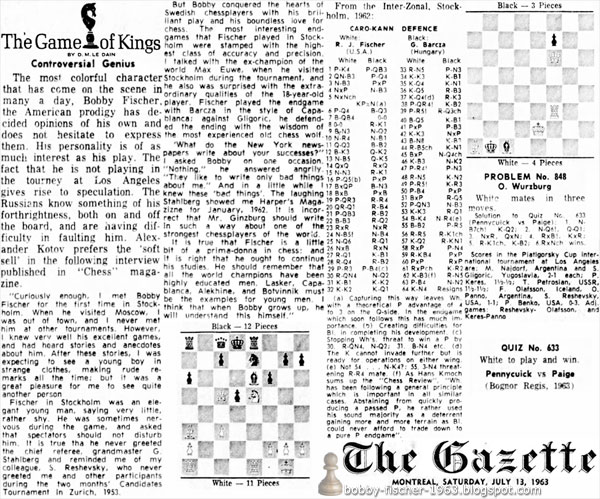The Gazette Montreal, Quebec, Canada Saturday, July 13, 1963 - Page 39
Controversial Genius
The most colorful character that has come on the scene in many a day, Bobby Fischer, the American prodigy has decided opinions of his own and does not hesitate to express them. His personality is of as much interest as his play. The fact that he is not playing in the tourney at Los Angeles gives rise to speculation. The Russians know something of his forthrightness, both on and off the board, and are having difficulty in faulting him. Alexander Kotov prefers the ‘soft sell’ in the following interview published in “Chess” magazine.
“Curiously enough, I met Bobby Fischer for the first time in Stockholm. When he visited Moscow, I was out of town, and I never met him at other tournaments. However, I knew very well his excellent games, and had heard stories and anecdotes about him. After these stories, I was expecting to see a young boy in strange clothes, making rude remarks all the time; but it was a great pleasure for me to see quite another person.
Fischer in Stockholm was an elegant young man, saying very little, rather shy. He was sometimes nervous during the game, and asked that spectators should not disturb him. It is true that he never greeted the chief referee, grandmaster G. Stahlberg and reminded me of my colleague, S. Reshevsky, who never greeted me and other participants during the two months' Candidates Tournament in Zurich, 1953.
But Bobby conquered the hearts of Swedish chess players with his brilliant play and his boundless love for chess. The most interesting endgames that Fischer played in Stockholm were stamped with the highest class of accuracy and precision. I talked with the ex-champion of the world Max Euwe, when he visited Stockholm during the tournament, and he also was surprised with the extraordinary qualities of the 18-year-old player. Fischer played the endgame with Barcza in the style of Capablanca; against Gligoric, he defended the ending with the wisdom of the most experienced old chess wolf.
‘What do the New York newspapers write about your successes?”
I asked Bobby on one occasion. “Nothing,” he answered angrily. ”They like to write only bad things about me.” And in a little while I knew these ‘bad things’. The laughing Stahlberg showed me Harper's Magazine for January 1962. It is incorrect that Mr. Ginzburg should write in such a way about one of the strongest chess players of the world.
It is true that Fischer is a little bit of a prima-donna in chess; and it is right that he ought to continue his studies. He should remember that all the world champions have been highly educated men. Lasker, Capablanca, Alekhine, and Botvinnik must be the examples for young men. I think that when Bobby grows up, he will understand this himself.”























